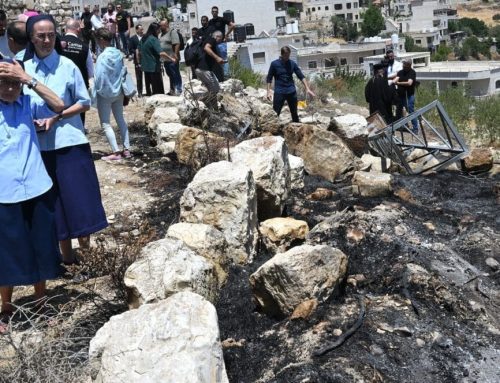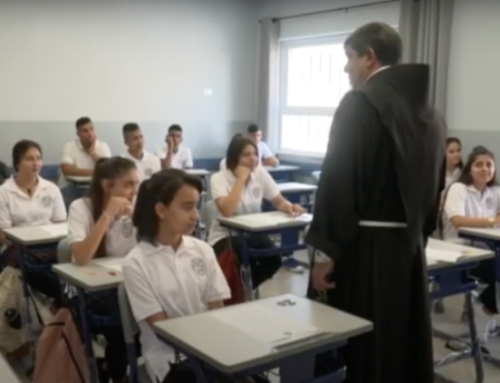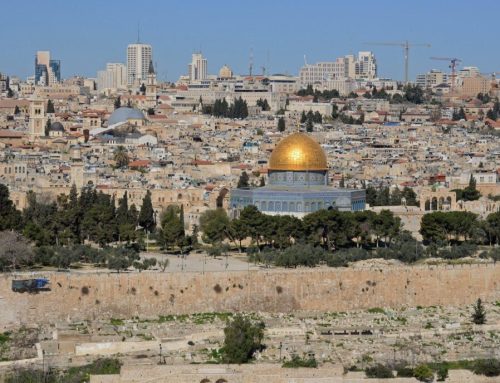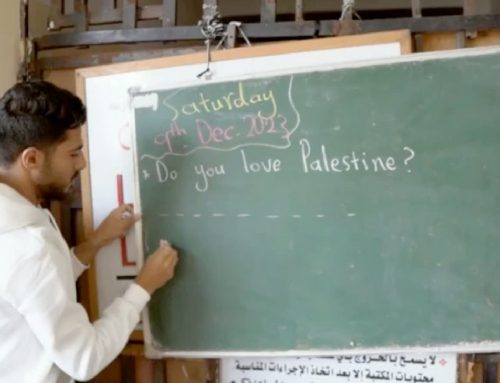A reflection By Rateb Y. Rabie, KCHS, HCEF president and CEO
Why are the Sufferings of the Palestinian Christians Being Made Invisible?
Carry each other’s burdens, and in this way you will fulfill the law of Christ.
Last week, I received news about two separate attacks on Holy Land churches. In Hebron, Palestine, Israeli settlers tried to forcibly take over Al-Baraka church and in Tabgha, Israel, the historic Multiplication of the Loaves and Fish Church was set on fire. These are the ongoing burdens that Palestinian Christians have had to bear as part of their 50 years of Israeli Occupation. But more than damage to the biblical buildings, my people, the living stones of our Mother Church, have also suffered personally in terms of access to education and employment, being made refugees, and most tragically, the loss of loved ones.
Just a few days before the news about Israeli attacks against these churches, I also received news that ISIS has threatened to “purify” Jerusalem by slaughtering Christians if they do not leave the city before the end of Ramadan on July 18.
While assaults against Middle East Christians in other regions have rightly received attention and concern from both the Western media and their Western Christian counterparts, the threats against Palestinian Christians continue to remain invisible and ignored. Palestinian Christians continue to have to bear this burden alone.
As a Palestinian Christian who has served the entire Middle East Christian community for decades, I have to ask why? Why are we considered the “lesser of our brethren?” And in particular, why do fellow American Christians – predominantly Evangelicals – not merely ignore this suffering but even contribute to it? Even those US organizations which have a specific mission to serve the Middle East Christian community continue to remain silent to these assaults, if the Christian victims also happen to be Palestinian.
I am reminded of the story of the Good Samaritan in which the injured man’s own community ignores him. Yet it was the outsider, the Samaritan, who showed neighborly compassion in helping the injured man.
As we all know too well, the rise of ISIS and other political factors has broken the coexistence between Muslims and Christians in various regions of the Middle East resulting in persecution and expulsion of Christian citizens, most particularly in Iraq and Syria. Masked as religious doctrine, these politically-driven violations are carried out by extremists in the name of Islam.
In response to their brethren’s suffering, the Palestinian Christian community, through HCEF did not keep silent. They extended their hand to their brothers and sisters in the Arab countries, even though they themselves have experienced one of the longest periods of persecution and suffering. They were joined by Muslims and other Christians of goodwill and together created the U.S. Muslim Christian Coalition (MCC) of which I was invited to be chair. This coalition has collectively remained united in addressing the challenges of this new extremism. The MCC recognizes that the persecution of Christians is not only and unimaginable act, but that these actions also violate our faith communities and even our Creator. Despite our own personal burdens, the persecution of Christians is a new burden that we must share.
When I last visited Jordan and brought much needed funds to the Syrian Christian refugees, it was the Muslim-Christian community here in the United States that helped raise those funds. Traditionally, Palestinians, both Muslim and Christian, have strived to carry each other’s burdens as they struggle together under Occupation. Today, we call this solidarity. But in the time of our Lord, it was simply the description of a good neighbor.
Our October 16-17, 2015 HCEF will hold its 17th International Conference and Awards Banquet whose theme this year is “Our Faith is A Commitment to Justice, Peace, and Coexistence.” The conference will be a perfect opportunity for American Christians and others to learn more about their neighbor or more aptly their Brother in Christ. I invite you to attend and more importantly, I invite you to be that good neighbor and Good Samaritan. I invite you to break the silence and recognize the suffering of the Palestinian Christian community. That is the first step towards fulfilling our Christian role in helping to carry each other’s burden.






